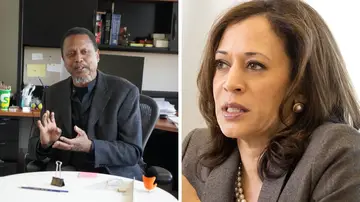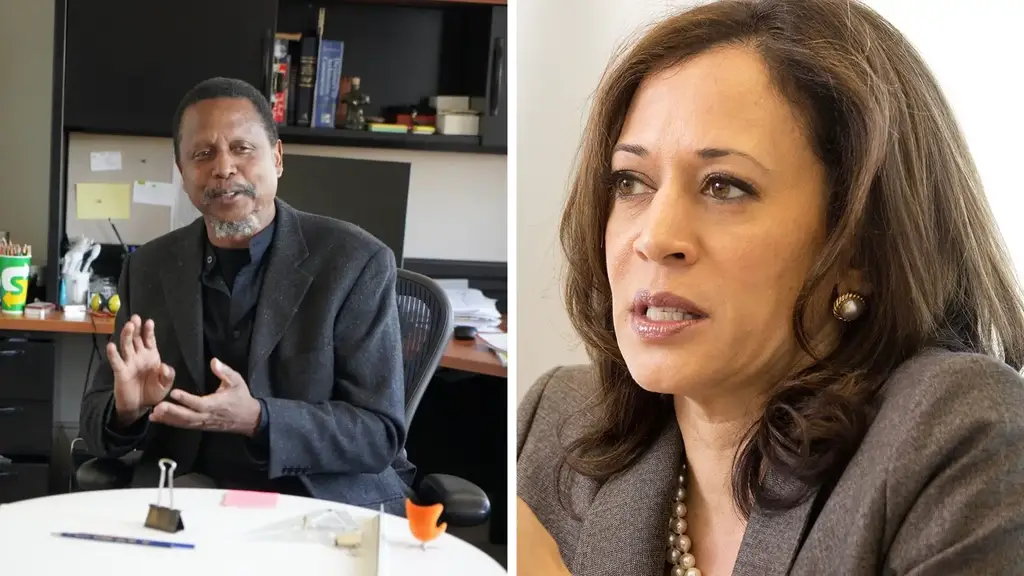
“It was like teaching a cat to play chess,” said Professor Emeritus Gerald Barnes, who still shakes his head whenever he recalls Harris’s time in his Introduction to Political Science class. “Kamala had this strange way of answering questions. If I asked her what the Constitution was, she’d smile that famous smile of hers and say, ‘The Constitution is a living document… full of potential, just like all of us.’ I mean, what does that even mean?”
According to Barnes, Harris was notorious for her ability to speak at length without actually saying anything. “I’d ask her a simple question about the three branches of government, and by the end of her answer, we’d somehow be talking about jazz music and the importance of self-expression. I still don’t know how she did it.”
Professor Meredith Johnston, who taught Harris in her Constitutional Law class, agreed. “Kamala was the queen of answering a question with a question. I’d ask her to define judicial review, and she’d reply, ‘But professor, shouldn’t we first ask ourselves, what is justice?’ It was maddening. And when I’d press her for a straight answer, she’d just laugh that signature laugh and say, ‘Come on, professor, don’t be so serious!’”
One of the most baffling aspects of Harris’s academic career, according to her former professors, was her remarkable ability to dodge any real engagement with the material. “I once asked her to write a paper on the separation of powers,” said Professor Franklin Davis, now retired but still haunted by the experience. “She turned in 12 pages on why power itself is an illusion, quoting Gandhi, Bob Dylan, and, for some reason, Kermit the Frog. I still don’t understand what I was supposed to take away from that.”
Davis recalls how he tried to give Harris a chance to explain herself. “I called her into my office to discuss the paper, and instead of explaining her thesis, she spent 45 minutes talking about how much she admired strong women in history—before asking if we could switch the topic to ‘the role of women in the founding of the Constitution.’ I mean, I appreciated her enthusiasm, but the girl just couldn’t stay on track!”
Perhaps the most legendary story comes from Harris’s time in her debate class, where she was supposed to argue for or against a proposed bill. Professor Judith Walters, who ran the course for 30 years, says she will never forget what happened when it was Kamala’s turn to take the stage.
“Kamala stood up, smiled confidently, and then… nothing. She just stood there, smiling, for what felt like an eternity. The entire class was staring at her, waiting for her to speak. Finally, she said, ‘What is debate, really?’ And that was it. That was her argument.”
Walters says Harris’s debate skills—or lack thereof—were a running joke for years. “We started calling that move ‘The Kamala.’ Anytime a student wasn’t prepared, they’d just stand there and smile, hoping their charisma would carry them through. It worked once or twice, but nobody ever mastered it like Kamala.”
Another professor, Dr. Leonard Clark, who taught Philosophy of Law, recounted Harris’s reliance on her trademark laugh to escape tricky academic situations. “Whenever Kamala was caught off guard in class, she’d laugh. A big, hearty laugh. It was like her secret weapon. I’d ask her to explain Hobbes’s view on the social contract, and she’d just laugh, say something vague about the ‘human condition,’ and then somehow pivot to talking about yoga. It was baffling.”
Clark admitted that, over time, professors just gave up. “It became a running joke in the faculty lounge. ‘Oh, Kamala didn’t turn in her paper? Just wait for the laugh.’ And sure enough, she’d waltz in, laugh her way through an excuse, and somehow walk out with an extension.”
How, you might wonder, did Harris manage to graduate? The professors have an answer for that, too: charm. “Kamala has always been incredibly likable,” Professor Barnes admitted. “Even when she was dodging questions and laughing off deadlines, you couldn’t help but like her. She was friendly, she was personable, and she always seemed genuinely excited to be there—even if she had no idea what was going on.”
Johnston agreed. “Kamala had a way of making you feel like you were the most important person in the room, even if she wasn’t paying attention to a single thing you said. I don’t know how she did it, but she had this aura about her. You just wanted her to succeed, even when she clearly wasn’t putting in the effort.”
In the end, it seems Harris’s charm carried her further than most students could dream. “I’m still not entirely sure how she passed my class,” Johnston admitted, laughing. “But here she is—one step away from the presidency. So, maybe she was onto something after all.”
When asked to comment on her professors’ claims, Harris reportedly laughed—a deep, resonant laugh that anyone familiar with her debates has heard countless times. “Well, I may not have been the best student, but I had fun, didn’t I?” she said with a smile. “Besides, life is about more than grades, isn’t it? It’s about relationships, about connecting with people. And I think I did that pretty well.”
Harris went on to joke that her professors had always underestimated her. “You know, they say I didn’t give straight answers, but here I am. Maybe all that dodging and weaving was just practice for politics. Who knew?”
And there you have it—Kamala Harris, the worst student Howard University has ever seen, but somehow, also one of its most successful.
While Harris’s professors may still be scratching their heads over how their worst student ended up in the White House, there’s a lesson here for all of us: Sometimes, in life, it’s not about knowing the answers. It’s about looking like you know the answers—and smiling confidently while you do it.
Kamala Harris might not have been the best student Howard University ever had, but she sure knew how to turn a C-grade education into an A-list career.


